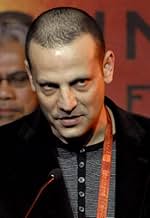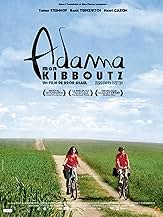Set in mid-70's, 12-year old Dvir Avni navigates between the equality values of his home-born Kibbutz and the relationship with his undermined mother, whom the Kibbutz members will to denoun... Read allSet in mid-70's, 12-year old Dvir Avni navigates between the equality values of his home-born Kibbutz and the relationship with his undermined mother, whom the Kibbutz members will to denounce.Set in mid-70's, 12-year old Dvir Avni navigates between the equality values of his home-born Kibbutz and the relationship with his undermined mother, whom the Kibbutz members will to denounce.
- Awards
- 9 wins & 7 nominations total
- Director
- Writer
- All cast & crew
- Production, box office & more at IMDbPro
Featured reviews
I think that it is unfair to say that this film is a vehicle to question the justification for a Jewish state, as the reviewer above notes. The film is a stark examination of the social and cultural pressures operating within the closed community of the kibbutz collective. No doubt, the response to the main character's illness both from the collective and from the individuals of the community receives harsh treatment here, but I fail to see this as a global condemnation of Israeli society. The main characters unraveling and her family's attempts to deal with this are very well done and the treatment is sincere and thoughtful. It's hard to believe that the story takes place as recently as 1974.Hadn't we come farther than that by then?
I saw this film in an audience of about 80 American Jews passionately devoted to Israel. Most had visited Kibbutzim, a number had lived on one or more. Some thought Dror Shaul's theme -- the claustrophobic atmosphere and pressure inflicted on a mentally unstable Kibbutz member -- reflected aspects of kibbutz life they had witnessed. Others saw it as a complete distortion of an Edenic, well-intentioned if ultimately unsuccessful, experiment. One thought it should not be shown to American audiences because it reflected badly on Israel. It is, frankly, an emotionally draining and heart-wrenching story about a youngster (Tomer Steinhof) and his unstable mother (Ronit Yudkevitz), whose instability is seriously aggravated if not caused by the unforgiving atmosphere on the kibbutz. Depending on your perspective, you might hate this film because it doesn't conform to your vision of kibbutz life. You may find it excessively unpleasant and dislike it for that reason. However, though it is undeniably dark, the movie is powerful, well-acted and beautifully directed. It provoked a long discussion among members of the audience whom I saw it with. Many were moved, some were angry. Most thought it was well worth seeing, as do I.
Terribly disturbing to see a man (thankfully not realistically) receiving oral sex from a calf in the opening few minutes. Fortunately it gets better. Much better. It won the World Cinema Jury Prize - Dramatic at Sundance as well as the top Israeli film award. We get to see a slice of life on a kibbutz in the 70's and what is presented is portrayed quite well here. It does appear, though, that there is some dissension amongst Jews on whether this is an accurate view or not. From this outsider's view, it's a great story that's well told with fantastic acting.
7.1 / 10 stars
--Zoooma, a Kat Pirate Screener
7.1 / 10 stars
--Zoooma, a Kat Pirate Screener
The cinematography in this film is somewhat fantastic. For this I feel the production team really succeeded and proved that amongst other international contemporary film makers, Israel can too present a film that is aesthetically pleasing.
In the director's cut, Dror Shaul claims that the film is of 'one boys vision' of his own current affairs and that there are no political views that hide behind the surface of the film. I disagree with this statement and although I have never experienced a Kibbutz before I am able to understand that this film takes on a very one-sided stance of the system, propaganda and regime of the kibbutz. Shaul fails to balance out the film and portrays it as an obsolete institute of total corrupt. He paints the opposite of an idealistic vision over it and I feel this might cause a bit of controversy amongst previous or current kibbutz members.
The story line is emotional. It really seems as though the director, team and actors have put a lot of effort and time into producing a story which is captivating yet subjective, submitting a senseful and sensitive drama which encourages the viewer to follow and react in accordance to the actors emotions.
It is a film to watch and certainly one of the greats of upcoming contemporary Israeli cinema.
In the director's cut, Dror Shaul claims that the film is of 'one boys vision' of his own current affairs and that there are no political views that hide behind the surface of the film. I disagree with this statement and although I have never experienced a Kibbutz before I am able to understand that this film takes on a very one-sided stance of the system, propaganda and regime of the kibbutz. Shaul fails to balance out the film and portrays it as an obsolete institute of total corrupt. He paints the opposite of an idealistic vision over it and I feel this might cause a bit of controversy amongst previous or current kibbutz members.
The story line is emotional. It really seems as though the director, team and actors have put a lot of effort and time into producing a story which is captivating yet subjective, submitting a senseful and sensitive drama which encourages the viewer to follow and react in accordance to the actors emotions.
It is a film to watch and certainly one of the greats of upcoming contemporary Israeli cinema.
10tonyw-21
This is the second feature film by Dror Shaul. Set on an Israeli kibbutz Bet-Gvurot in 1974, this provocative film explores life on the kibbutzim in its most hilarious and dark forms. Dvir (Tom Steinhof) is an adventurous 12-year old who protects his mother Miri (Roni Yudkevitch), a single parent who is emotionally unstable. Miri forms a long-distance romance with an older man in Switzerland Stephan (Henri Garcin). When Stephan comes to visit, Miri emerges from her darkness and for an instant, her life shines. When Stephan's actions bring him into conflict with the leadership of the kibbutz, he is banished and Miri regresses. Dvir's brother Eyal (Pini Tabger) goes off to fight in the Yom Kippur War and Dvir is on his own and restless as he approaches his Bar Mitzvah. The film paints an unflattering image of life on the kibbutz, raising issues such as alcoholism, promiscuity, and acute isolation. When Shaul offered an advance screening at a kibbutz in Israel, they were reportedly shocked and offended. A poignant and funny film with a bitter-sweet ending.
Did you know
- TriviaDanielle Kitsis's debut.
Details
Box office
- Budget
- $1,500,000 (estimated)
- Gross worldwide
- $122,307
- Runtime
- 1h 30m(90 min)
- Color
- Sound mix
- Aspect ratio
- 1.85 : 1
Contribute to this page
Suggest an edit or add missing content





















